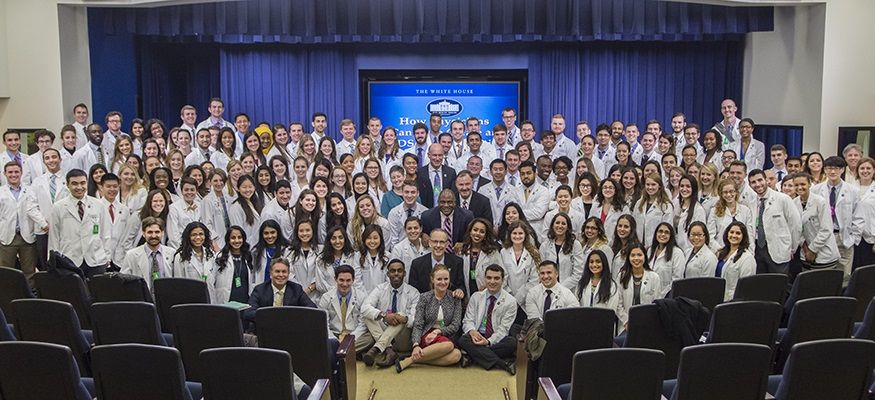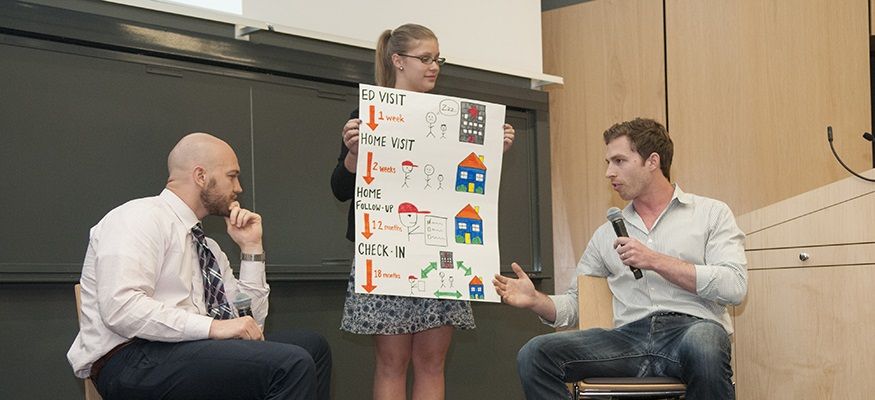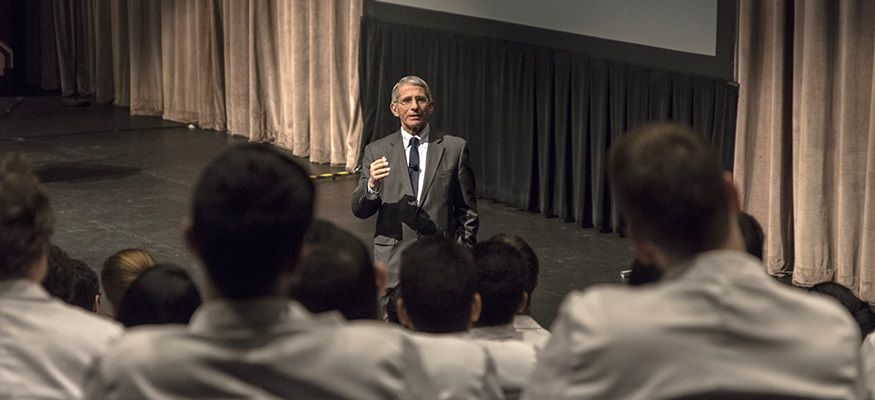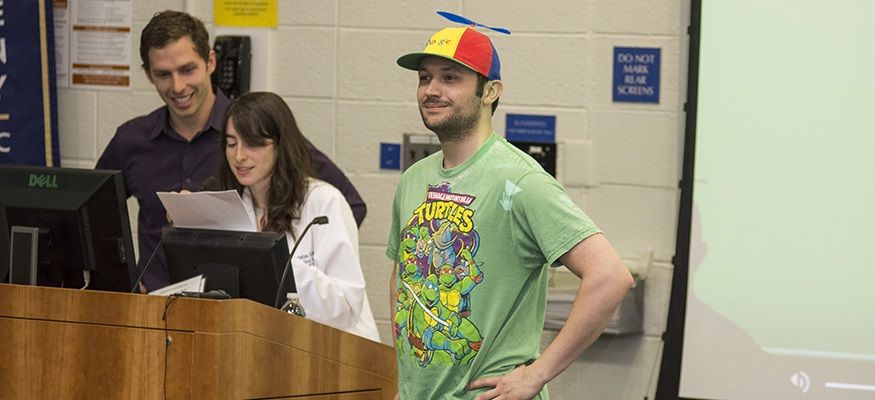Summits are the hallmark of the Clinical Public Health curriculum. These applied educational experiences comprise a series of unique multi-day real-world field projects across the four years of medical education. These Summits build on the medical curriculum, extending that knowledge to related important public health issues, while instilling foundational knowledge and skill-building in public health and population health, public health research techniques, critical and creative thinking, teamwork and leadership skills, community engagement, and translation of knowledge into action.
The Summit projects require students to collaborate with and be evaluated by local and national public health, policy, health system, research, and community experts and decision-makers uniquely available to GW SMHS given of our location in Washington, D.C. Working in teams, students must address topics chosen specifically to enrich students’ current curriculum or clerkship rotation work, and are intended to be instructive, aspirational, and innovative. As the curriculum progresses, the projects require increasingly complex real-world problem-solving, synthesis of basic and clinical science learning with population health and public health knowledge, and application of policy, advocacy, and leadership skills.
These Summits are at the forefront of Clinical Public Health curricular efforts within the field of medical education. The cutting edge nature of this novel program has caught the attention of medical schools, physicians, public health experts, and the media alike. The program was featured in an NPR Morning Edition story and NPR article.
The first two Summits are part of the PPS courses, while the third Summit takes place during an Intersession. The topics and focus of each Clinical Public Health Summit will continue to evolve to focus on contemporary issues of public health and community health. The 4th and final Clinical Public Health Summit is a longitudinal project that runs most of the 4th year of the MD curriculum. Recent Clinical Public Health Summits have included:
- Fall of Year 1: How Physicians Can Help End the HIV Epidemic
-
The School of Medicine and Health Sciences at the George Washington University is delighted to partner with the National Alliance of State and Territorial AIDS Directors (NASTAD) to create an opportunity for first-year medical students to study the federal "Ending the HIV Epidemic: A Plan for America" initiative and develop innovative proposals to address the HIV epidemic at the local level.
Students have the opportunity to work directly with senior officials and experts from different jurisdictions to learn firsthand about each jurisdiction's unique HIV epidemic. Over past years, NASTAD and GW have hosted HIV/AIDS officials from across the country - from Washington State to Washington DC - to work with GW medical students during this summit.
The Clinical Public Health Summit on HIV is the capstone event of the first semester. It is constructed as a scientific conference and problem-solving activity in which students are exposed to the latest data on HIV/AIDS, interact with scientific and public health experts in the field, and work in teams to develop a state- or city-level action plan to improve HIV/AIDS community health. The Summit will provide students with experience in the Clinical Public Health roles they will take on as physicians practicing 21st century medicine, and as community health leaders who can translate basic sciences, pharmacotherapy, epidemimology, and knowledge of health systems into population-level action.
Samples of Students Proposals:
-
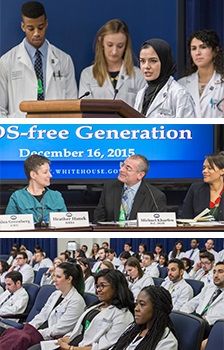
Development and dissemination of mobile apps for immediate direct-to-consumer delivery of HIV rapid test kit, linkage to access programs for PrEP (Pre-exposure prophylaxis medication) and promotion of HIV medication adherence.
- Continuing medical education incentives for improved primary care/family medicine/ob-gyn training in routine HIV medicine, with deployment of virtual/telemedicine HIV specialty back-up.
- Medical student loan forgiveness program or business tax incentives for physicians who provide broad HIV test counseling and testing for their patients.
- Programs for improved access to clean needles (i.e., in pharmacies or public vending machines) and medication assisted treatments for people who inject drugs.
Related News:
- Creating an AIDS-Free Generation
- How Physicians Can Help Create an AIDS Free Generation
- First-Year Students Present at White House for 2015 Intersession
-
- Spring of Year 1: How Physicians Can Help Eliminate Childhood Asthma in Washington, D.C.
-
After the spring semester, all students participate in a multi-day Summit to better understand their role, as future physicians, in controlling and mitigating asthma for children living in Washington, D.C. In collaboration with Stephen Teach, M.D., M.P.H., Chair of the Department of Pediatrics at GW SMHS and Director of IMPACT DC (a community asthma program dedicated to the care, research, and advocacy for under-resourced and minority children with asthma in Washington, D.C., recognized by President Obama as a model program), this Summit includes a panel of children with asthma and their families, who share their daily struggles of living with asthma.
Students work in groups to conduct field visits, consult experts, and create policy proposals on prevention and treatment of asthma. At the end of the Summit, student groups present their proposals to a panel of leading asthma and policy experts as well as families with asthma in the D.C. area.
Samples of Student Proposals:
-
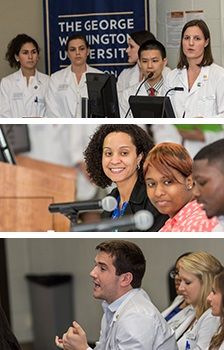
“AsthMama” - development and deployment of a "smart bracelet" capable of measuring a child's vital signs and blood oxygen level and communication device to alert parents, school nurses and clinicians about a possible asthma exacerbation.
- Teen Peer Educator Program to link high school students who have good asthma management skills to younger, newly diagnosed children with asthma.
- Air quality improvement programs that target changes in public transportation and highway tolls to reduce auto emissions in areas with high rates of childhood asthma and/or focused improvement in air quality in schools themselves, to reduce asthma attacks.
Related Links:
- How Physicians Can Help Eliminate Childhood Asthma in D.C.
- Eliminating Childhood Asthma (Photos)
- Eliminating Childhood Asthma in D.C.
-
- Spring between Year 2 – Year 3: Addressing Injury Through the Public Health Lens
-
As students begin their 3rd year clinical clerkships they participate in a Summit that addresses the pressing public health issue of Injury Prevention at the clinical and population levels. This Summit, debuting in 2025, consists of two phases that culminate in a final policy brief to prevent, reduce, and/or mitigate Injury in one of four areas (Injury in the Elderly, Injury in Pediatric populations, Interpersonal Injury, and Road-Related Injury) at one of three policy levels (Non-government organizations, State, and Federal). This Summit also provides an opportunity for Interprofessional Education by involving students from SMHS's Physician Assistant program. The Summit is enhanced by the attendance of expert panelists and judges who share their experiences, knowledge, and best practices.
- The initial phase focuses on the idea that all injury is preventable, and will feature a keynote address by Dr. Samir Fakhry, panels on the different injury types, and a statement of impact from a patient who has personally experienced injury.
- Students are then introduced to policy briefs, and break into small groups to create and present policy briefs for the various injury types and levels of policy.
- Year 4: Your Residency Choice and Your Career: How Physicians Can Help Improve Population Health In Every Specialty
-
To succeed in any field of medicine, all physicians must be prepared to deliver the highest quality care to individuals while understanding – and advocating for improvement of – the myriad factors that influence patients’ health but lay beyond individual clinical encounters. To that end, physicians must be knowledgeable of – and able to work with others to address – factors in patients’ lives, hospitals and health systems, communities and governments and in their own area of specialization and practice that may positively or negatively impact patients and their health.
Likewise, in order to be successful in any field of medicine, all physicians must maintain good health and achieve a balance of professional and personal priorities. Physician burn-out is increasing and is directly linked to poor patient care, increased malpractice suits, exit from the field and physician suicide.
During this culminating longitudinal self-directed Clinical Public Health Summit, all students will address these dual realities through two assignments:
- Working with faculty experts, mentors, and relevant stakeholders, select and research a Clinical Public Health topic in their chosen medical specialty and develop a Clinical Pubic Health Action Plan to implement as a student, trainee or practitioner to address, improve, remediate, or advance your chosen topic.
- Assess their own wellness priorities with tools and resources provided by faculty, and develop and evaluate a personal Wellness and Resilience Action Plan for the 4th year of medical school.
Samples of Student Clinical Public Health Topics:
- Advancing Pre-exposure Prophylaxis Delivery among Latino MSM (men who have sex with men) in D.C.
- Climate Change and Health: Using Medical Education to Prepare and Empower Clinicians to Mitigate the Negative Effects of Climate Change on Health in the D.C. metro region
- Community Organization Factors Affecting Veteran Participation in Adaptive Sports
- Sexual Assault Training for Medical Providers
- Telemedicine Implementation to Improve Clinical Outcomes & Satisfaction in end-stage renal disease Patients on HD
- Understanding and Adherence of Glaucoma Medication Among Ophthalmology Patients
